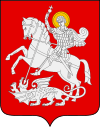Telecommunications in Georgia (country)
Telecommunications in Georgia include radio, television, fixed and mobile telephones, and the Internet.
Radio and television
- Radio broadcast stations: AM 7, FM 12, shortwave 4 (1998).
- Radios: 3.02 million (1997).
- Television broadcast stations: 25 (plus repeaters) (2011).
- Televisions: 2.57 million (1997).
Cellular Networks
- Calling code: +995
- Mobile Phone subscribers: 3.1 million lines (2009)[1]
The TLC sector in Georgia comprised 6.88% of the GDP, mostly due to mobile telephony (63%), followed by fixed telephony (29%) and broadcasting (7.7%).[2]
There are three cellular telephone networks: MagtiCom LTD,[3] Silknet JSC,[4] and Mobitel Georgia (Russian Beeline group).[5] The cellular network market counts more than 3,000,000 active customers in total.
Coverage extends to over 98% of the populated territory as of 2010;[6] In urban areas there are 20 telephones per 100 people and in rural areas 4 telephones per 100 people.
Fix Telephony, Internet and IP Television
- Internet Service Providers: at least 10 ISPs.
- Fix Phone Subscribers: 830,222 lines in use (2009)[1]
- Top-level domain: .ge
The fixed telephony, internet and IP television in Georgia is mainly operated by the Silknet, New Net and MagtiCom controlled 90% of the market in 2018. By the end of 2008, there were 618,000 fixed telephone users in Georgia.[2] In urban areas there are 20 telephones per 100 people, and in rural areas there are four telephones per 100 people.
Fiber-optic lines connect the major cities and Georgia and Bulgaria are connected with fiber-optic line between Poti and Varna (Bulgaria).
Internet censorship and surveillance
Listed as engaged in selective Internet filtering in the political and conflict/security areas and as no evidence of filtering in the social and Internet tools areas by the OpenNet Initiative (ONI) in November 2010.[7]
Access to Internet content in Georgia is largely unrestricted as the legal constitutional framework, developed after the 2003 Rose Revolution, established a series of provisions that should, in theory, curtail any attempts by the state to censor the Internet. At the same time, these legal instruments have not been sufficient to prevent limited filtering on corporate and educational networks. Georgia's dependence on international connectivity makes it vulnerable to upstream filtering, evident in the March 2008 blocking of YouTube by Turk Telecom.[7]
On March 14, 2016, access to YouTube was restricted nationwide. This restriction of access was to presumably prevent Georgian citizens from accessing a video which threatened a number of journalists and opposition figures with the exposure of covertly recorded video tapes of sex acts. YouTube access went down throughout Georgia until the threatening video was removed from the internet.[8]
References

- Annual Report (2009), Georgian National Agency of Communications.
- Maia Mikashavidze, Georgia #Telecommunications, EJC Media Landscapes, circa 2010
- Magticom. "Magticom / მთავარი". მაგთიკომი.
- http://www.silknet.com
- "ბილაინი". www.beeline.ge.
- http://www.magticom.ge/index.php?section=19&lang=geo
- "ONI Country Profile: Georgia", OpenNet Initiative, November 2010
- Georgia, Civil. "Civil.Ge - Politicians, Journalist Threatened with Sex Tape Leak". civil.ge.
External links
- Georgian National Communications Commission, website.
- Sidorenko, Alexey, "Internet, Society and Democracy in Georgia", in Caucasus Analytical Digest No. 15.
- Robakidze, Nino, "Georgia: Immature Media", in Caucasus Analytical Digest No. 25.
